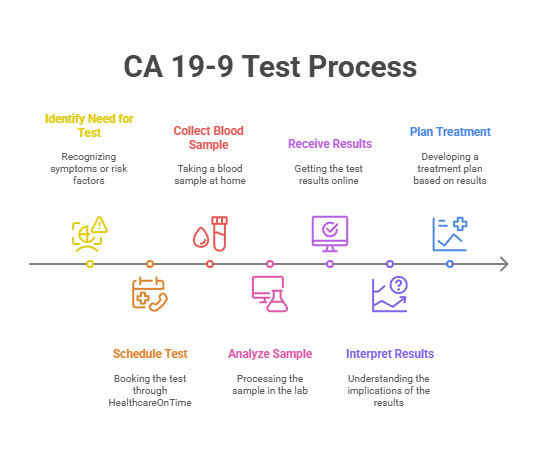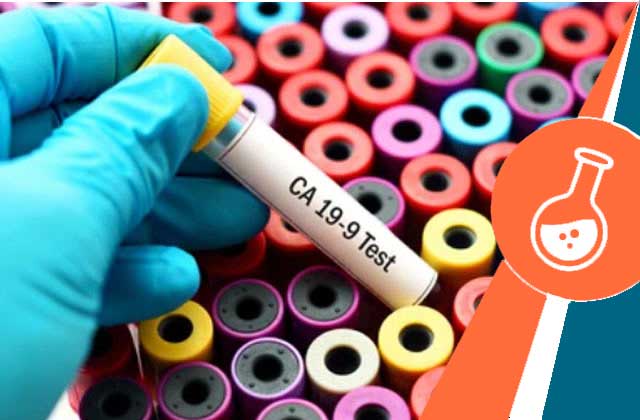
What Is CA 19.9 Test (Pancreatic Cancer Marker)
Cancer has been a global health concern, more so lately, despite the medical advancements and innovations. Detecting cancers early paves the way for on-time treatment and good quality of life. However, since certain cancers don’t exhibit identifiable symptoms until they are in the advanced phases, such as pancreatic and gastrointestinal cancers, periodic cancer screening is highly recommended.
The CA 19.9 test, also known as the cancer antigen 19.9 test, is a blood test used to measure the levels of a specific protein called CA 19.9 in your bloodstream, which indicates the presence of cancerous developments. CA 19.9 marker or CA 19.9 pancreatic cancer marker is associated with certain types of cancer, particularly pancreatic and gastrointestinal cancers. Your healthcare provider recommends this test to diagnose, monitor, and manage these cancers effectively.
About CA 19.9 Blood Test
Learn everything about cancer antigen 19 9 Testing before you book lab test online. Understand the why, how, and what of this test.
Why Do I Need CA 19.9 Test?
Your healthcare provider recommend you to go for a CA 19.9 test:
- If your healthcare provider suspects pancreatic cancer or gastrointestinal cancer based on your symptoms, medical history, or other diagnostic tests
- If you have been diagnosed with cancer and are undergoing treatment, this test can help your healthcare provider monitor your response to therapy and detect any recurrence.
- To track the progression of cancer and determine if it is spreading to nearby tissues or organs.
- For routine cancer screening process, especially if you have a family history or past history of pancreatic and gastrointestinal cancers
- If you have been diagnosed with cancers of the bile duct, colon and rectum, stomach, ovaries and bladder
Test Result Interpretation
You’ve received your CA 19.9 Test results, but you may still need assistance determining if they fall within the normal range. Continue reading this section to gain clarity on whether your CA 19.9 Test Results are within the expected range or not.
What Does CA 19.9 Test Results Mean?
The CA 19.9 blood test results may vary based on an array of factors. Elevated CA 19.9 levels might indicate various medical conditions. However, it’s important to note that a high CA 19.9 level is not a definitive diagnosis of cancer. Other factors, such as inflammation and benign conditions, can also lead to elevated CA 19.9 levels.
If your serum CA 19.9 levels are increasing, it may mean that your cancer is growing and not responding to the treatment as expected. If the CA 19.9 levels are decreasing, it may mean that the tumour is shrinking and the treatment is working. If the levels remain stable, it means that your cancer care is stable. However, if your CA 19.9 levels decrease and then again increase, it might mean your cancer is relapsing. In such circumstances, you should immediately consult your healthcare provider.
What is the CA 19.9 Marker Test Normal Range?
The CA 19.9 normal range is less than 37 U/mL.
It’s important to remember that the CA 19.9 test normal range can vary among individuals, and some people may have slightly higher or lower baseline CA 19.9 levels without having an underlying medical condition.
What Medical Conditions Can Cause High CA 19.9 Levels?
Elevated CA 19.9 levels can be caused by various medical conditions, including:
- Pancreatic Cancer
- Pancreatitis
- Gastrointestinal Cancers
- Benign Pancreatic Conditions
- Liver Disease
- Gallbladder Disease
- Inflammatory Bowel Disease
- Bile duct disease
- Cystic fibrosis
What Medical Conditions Can Cause Low CA 19.9 Levels?
Low CA 19.9 levels are generally considered within the normal range and are not typically associated with specific medical conditions. However, it’s important to note that CA 19.9 is not a marker for all types of cancer or diseases. In some individuals, CA 19.9 levels may naturally be lower than the reference range without any underlying health issues.
Why Choose HealthcareOnTime?
Convenience at Your Doorstep
Ever wished for healthcare that comes to you? HealthcareOnTime makes it a reality with doorstep lab testing, cutting out clinic hassles. No more queues or travel stress. Experience at-home sample collection, prioritizing health without time constraints. —your path to health, now just a doorstep away!
Affordable Testing with Thyrocare Partnership
Experience cost-effective lab testing at-home with HealthcareOnTime’s exclusive partnership with Thyrocare. Benefit from competitive prices while ensuring precise results. Our collaboration with Thyrocare Technologies Limited guarantees affordability without compromising on the accuracy and reliability of your lab test.
Comprehensive Health Screening
At HealthcareOnTime, we’ve got your back with our comprehensive health checkup packages! Take charge of your well-being by booking online. These packages empower you to stay ahead, catching potential issues early for timely management. It’s like having a health ally, and making informed decisions for a healthier, happier life.
Disclaimer: Although we have endeavoured to provide accurate information on this page, we strongly recommend that you seek advice from your doctor before relying on any of the test ranges or lab-test recommendations mentioned herein.
More Related Tests
Why To Book with HealthCareOnTime

17 Crores+ Samples Processed

World Class Technology Labs

25+ Years of Trust & Experience











